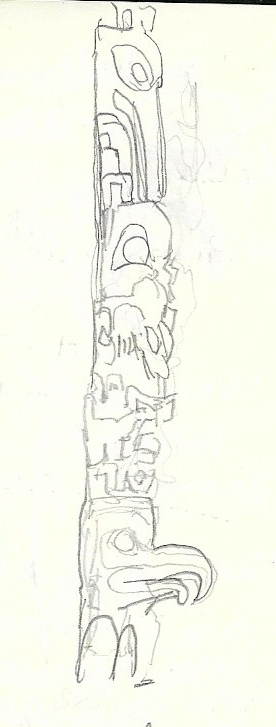We Don’t Believe Darwin, Yet
The rough sketch below is of one of the totem poles in Great Hall of the Field Museum of Chicago. It is considered an example of totemism, the belief that humans have kinship with the natural world. As James Frazer put it, a totem “is an intimate relation which is supposed to exist between a group of kindred people on the one side and a species of natural or artificial objects on the other side, which objects are called the totems of the human group.” The word derives from an Ojibwe root, “ote,” meaning “uterine kin.” A totem is literally descended from one’s mother, and is therefore subject to rules of family relationship. Totemism is part of the animist, pre-agricultural world-view that we humans have held for 98% of our existence. Hunting and gathering peoples, which all of us were until about 9,000 years ago, acknowledged kinship with the animals and plants around them; this is reflected in many current Native American beliefs, summed up in the frequently-used Lakota slogan, “We are all relatives” (though for a more nuanced look at this, see http://www.lakotacountrytimes.com/common/PastArchives/1237.html). It is only when humans develop intensive monocultures that we propose the fiction of separateness, a fiction which grows in relation to the our perceived mastery over the biological world. Which is all to say, Darwin’s theory of evolution would have astounded no-one from the pre-agricultural world: it was obvious that we are related to other species. That this idea was–and still is–such an affront to the dignity of “civilized” Westerners is a testament to the rigidity of agricultural (and pastoral) ideology.

One of the consequences of seeing humans as separate and distinct from animals and plants is loneliness. The person who carved this totem pole was completely enmeshed in a web of relations. His life was restricted by taboos and obligations–but he was never isolated.
The fiction of separateness arises in the 17th century, with the triumph of reductive rationalism and neo-Lucretian atomism. In the Cartesian age, only the human mind was important–animals were no better than automatons, and the world was like a great clock–active but dead. This mindset enabled endless expansion: it cleared the world of agency. All the intricate relations that once were posited–even for Medieval westerners–were swept away, giving Moderns a free field of action. If we were not kin to the plants and animals we were exploiting for profit, there was no sense of taboo in our action, no check to our expansion (and nothing to save us from collapse, as it turns out). We cling to this self-glorifying separatism, and that is why Darwin is scandalous–not just for religious fundamentalists, but Moderns who embrace a special human destiny. Many people pay lip service to evolution, but they actually interpret it as teleology: inevitable progress, leading up to (surprise!) humans. The actual theory does not posit that: it simply says that we must take life as a whole to be a vast machine for generating adaptive responses to the corrosive winds of chance and entropic decay. I always recall one crucial sentence in The Origin of the Species: “Let it also be borne in mind how infinitely complex and close-fitting are the mutual relations of all organic beings to each other and to their physical conditions of life; and consequently what infinitely varied diversities of structure might be of use to each being under changing conditions of life.”
Our main competition is not each other: it is Death. No being on the planet can exist alone. We are locked in webs of competition and mutuality. Every decade we find new evidence of the inter-relatedness of all beings. Yet our ideology, born of agricultural dominance, continues to drive us to act as if we alone mattered.
Discover more from James Armstrong
Subscribe to get the latest posts sent to your email.
[…] people had about the genetic unity of life–insights that resurfaced with Darwin (https://thinearth.blog/2017/08/23/we-dont-believe-darwin-yet/). In America we are lucky to have, close at hand, the spiritual beliefs of Native Americans to […]